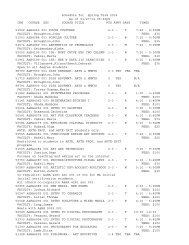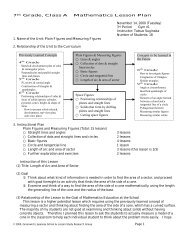The Comparative Fallacy in SLA Literature - Teachers College ...
The Comparative Fallacy in SLA Literature - Teachers College ...
The Comparative Fallacy in SLA Literature - Teachers College ...
You also want an ePaper? Increase the reach of your titles
YUMPU automatically turns print PDFs into web optimized ePapers that Google loves.
<strong>Teachers</strong> <strong>College</strong>, Columbia University Work<strong>in</strong>g Papers <strong>in</strong> TESOL & Applied L<strong>in</strong>guistics, Vol. 4, No. 1<br />
<strong>The</strong> Forum<br />
some support to the role of corrective feedback on rule generation, they failed to f<strong>in</strong>d the<br />
learners’ underly<strong>in</strong>g <strong>in</strong>ternal systems restructured by the feedback. Consequently, the lack of<br />
understand<strong>in</strong>g of the learners’ <strong>in</strong>ternal systems may threaten the validity of these studies, as<br />
Bley-Vroman noted.<br />
CONCLUSION<br />
Empirical studies which merely count learners’ errors and then measure the learners’<br />
<strong>in</strong>terlanguage systems are likely to fall <strong>in</strong>to the comparative fallacy (Bley-Vroman, 1983).<br />
Unfortunately, a considerable amount of research on the efficacy of corrective feedback <strong>in</strong> L2<br />
development has been conducted <strong>in</strong> this manner, that is, the learners’ exhibited l<strong>in</strong>guistic ga<strong>in</strong>s<br />
have been assessed by a s<strong>in</strong>gle TL scheme (target-like or non-target-like utterances). This<br />
measurement is not <strong>in</strong>sightful enough to explore the learners’ developmental processes. If so,<br />
how can learners’ developmental processes be measured <strong>in</strong> studies on corrective feedback?<br />
Doughty and Varela (1998) provided one possible way to avoid the comparative fallacy. <strong>The</strong>y<br />
employed <strong>in</strong>terlanguage analysis which measures learners’ performance <strong>in</strong> three ways: (a)<br />
changes to target-like use, (b) changes that showed improvements while still fall<strong>in</strong>g short of the<br />
full target version, and (c) decl<strong>in</strong>es <strong>in</strong> non-target-like use. This measurement enabled the<br />
researchers to track the learners’ developmental processes caused by the provision of feedback.<br />
In order to assess learners’ <strong>in</strong>ternal systems and avoid the comparative fallacy, there is a need to<br />
develop sophisticated and <strong>in</strong>sightful measurement.<br />
Furthermore, it may be possible to discern some pedagogical implications here. In most<br />
cases, students’ errors are judged by the target norms teachers possess, and the teachers provide<br />
feedback to the students based on their judgment. If the students’ <strong>in</strong>ternal logic is not counted<br />
and the teachers’ provision of feedback solely relies on the teachers’ logic, this feedback can fall<br />
<strong>in</strong>to the comparative fallacy. This eventually br<strong>in</strong>gs about mismatches between the teachers’<br />
<strong>in</strong>tention and the students’ <strong>in</strong>terpretations, which can render corrective feedback <strong>in</strong>effective. It<br />
should be noted that teachers, as feedback providers, have to make an effort to adapt themselves<br />
to learners and look at their <strong>in</strong>ternal systems <strong>in</strong> order to use feedback to facilitate the learners’ IL<br />
development.<br />
REFERENCES<br />
Adjemian, C. (1976). On the nature of <strong>in</strong>terlanguage systems. Language Learn<strong>in</strong>g, 26,<br />
297-320.<br />
Bley-Vroman, R. (1983). <strong>The</strong> comparative fallacy <strong>in</strong> <strong>in</strong>terlanguage studies: <strong>The</strong> cast of<br />
systematicity. Language Learn<strong>in</strong>g, 33, 1-17.<br />
Carroll, S., & Swa<strong>in</strong>, M. (1993). Explicit and implicit negative feedback: An empirical study of<br />
the learn<strong>in</strong>g of l<strong>in</strong>guistic generalizations. Studies <strong>in</strong> Second Language<br />
Acquisition, 15, 357-386.<br />
Cook, V. (1999). Go<strong>in</strong>g beyond the native speaker <strong>in</strong> language teach<strong>in</strong>g. TESOL<br />
Quarterly, 33, 185-209.<br />
Corder, S.P. (1967). <strong>The</strong> significance of learners’ errors. IRAL, 5, 161-170.<br />
4


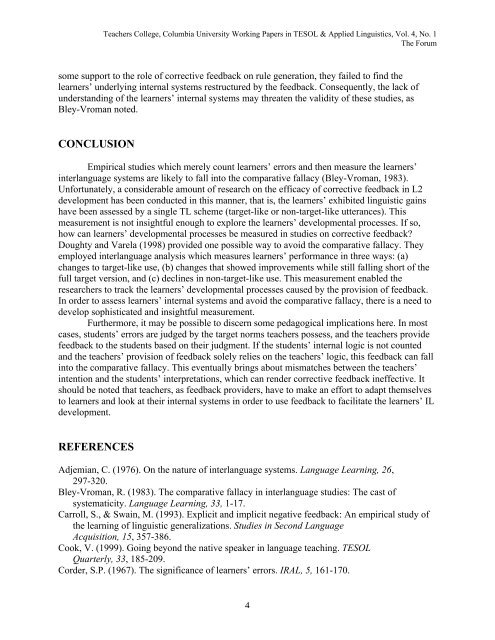

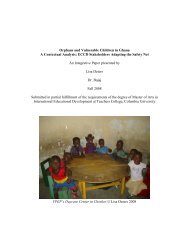

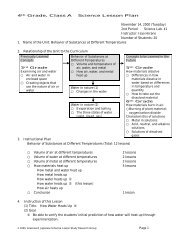

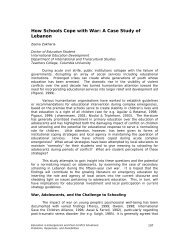




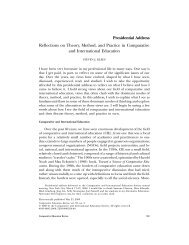
![TC Tod[...].pdf - Teachers College Columbia University](https://img.yumpu.com/27074883/1/190x252/tc-todpdf-teachers-college-columbia-university.jpg?quality=85)
